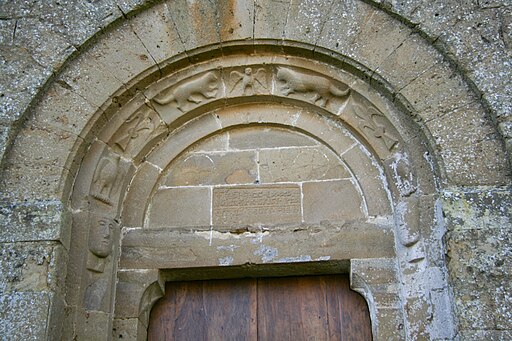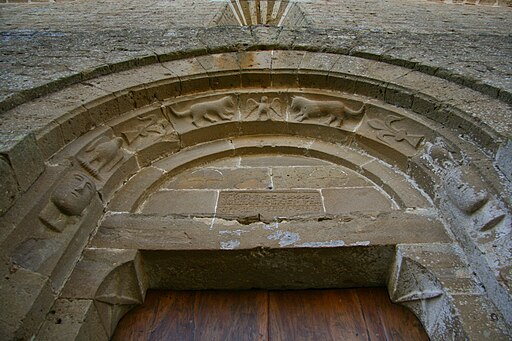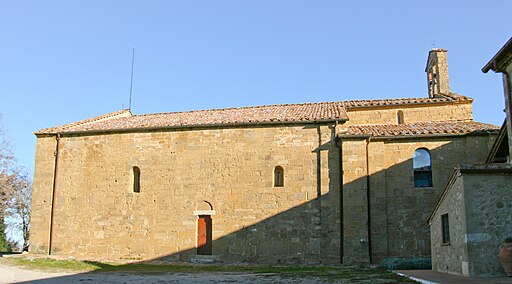| |
|
 |
 |

|
| |
Pieve di Santo Stefano a Cennano, absis
e
|
|
![Toacana ] Galleria di immagini](../../titels/albump.gif) |
|
| |
 |
|
|
| |
|
The pieve di Santo Stefano a Cennano
|
|
|
|
| |
|
| The Pieve San Stefano in Cennano, of paleo-Christian origin, arose around the center of what was a Roman settlement, a "vicus". It was situated in an uncivilized area, a part of the greater municipality of Roman Arezzo. It was built on the foundations of a former pagan temple. It is sited along an Etruscan-Roman road leading from Chiusi towards Chianti and Fiesole. The structure already existed in the 4th century, (perhaps consecrated by Saint Donato, second Bishop of Arezzo, who was an evangelizer in this area) as a "baptismal church" when civilized laws advanced into this rural district of plebians. But it was documented for the first time in a decree of Luitprando in 715, which is preserved in the archives of the church in Arezzo. As part of a group of 19 Pievi, it was the object of a famous dispute between the Bishops of Siena and Arezzo, over the question of to whom they belonged, which went on until 1220. Of the 19 ancient baptismal churches, Cennano and Corsignano are the only ones which have retained any integrity, while the others either no longer exist or have been radically altered.
From the point of view of history, the Pieve was very important starting from the 7th and 8th centuries till the end of the 14th century, when it was under the same the ecclesiastical and civil jurisdiction as Chiese di S. Flora in Montisi, S. Pietro in Petroio, S. Guisto in Castelmuzio and the Monastery of the Pilgrim in Passeno, near Castelmuzio. This monastery had been founded in the 7th century (653-661) by a Longobardian lord named "Ursus Ariman", and was located close to an alternate route of the Roman via Francigena. The 16th century marked the beginning of its decline; Castelmuzio was growing as its castle was fortified, and the Church of Santa Maria took over those functions which had remained at the Pieve. The church(s) kept on performing (some) ecclesiastical functions in the immediate area until 1723.
In September, the Festa della Pieve di Cennano is celebrated.
|
|
|
|
| |
|
|
|
| |
|
Map of the pieve di Santo Stefano a Cennano, Castelmuzio (Siena)
|
|
|
|
|

Coordinates 43° 08′ 39.47″ N, 11° 39′ 07.46″ E
Scheda nei "Luoghi della Fede", Regione Toscana
|
 |
| Castelmuzio, Pieve di Santo Stefano a Cennano, veduta esterna da Via della Pieve
|

One of Tuscany's best-kept secrets is the beautiful valley sheltering this recently renovated 19th-century formal cloister, offering charming and private accommodation for a unique holiday experience.
The Tuscan Maremma, the natural habitat of venison, roe deer, fallow deer, wild boars, foxes, beech marten, weasels, badgers, porcupines, hares and one of the most mysterious and unapproachable predators, the wolf. Don't' expect to see wolves in our garden, but you might spot them in the surrounding valleys, or in one of the many Nature Reserves.
Tuscany Holiday Homes | Vacation Home to Rent in Tuscany | Podere Santa Pia
|
| |
|
|
|
|
|
|
|
Podere Santa Pia |
|
Podere Santa Pia, garden |
|
 Follow us on Instagram Follow us on Instagram
|
| |
|
|
|
|

Pieve di Santo Stefano a Cennano
|
|
|
 |
|
 |
|
 |
Portale principale
|
|
Decorazioni del portale principale |
|
Particolare del portale principale |
 |
|
 |
|
 |
Pieve di Santo Stefano a Cennano. Absidi
|
|
Pieve di Santo Stefano a Cennano. Absidi (particolare) |
|
Pieve di Santo Stefano a Cennano. Absidi (particolare) |
 |
|
 |
|
 |
Pieve Santo Stefano a Cennano. Vista laterale
|
|
Pieve di Santo Stefano a Cennano. Finestra laterale |
|
Pieve di Santo Stefano a Cennano. Finestra laterale |
|
 |
|
 |
|
 |
Panorama of Montisi from Via degli Ortali
|
|
Trequanda, Panorama dalla strada per Sinalunga |
|
Panorama Trequanda |
|
|
|
| |
|
|
|
| |
|
|
|
| |
|
|
|
| |
|
|
|
| |
|
|
|
| |
|
|
|
|